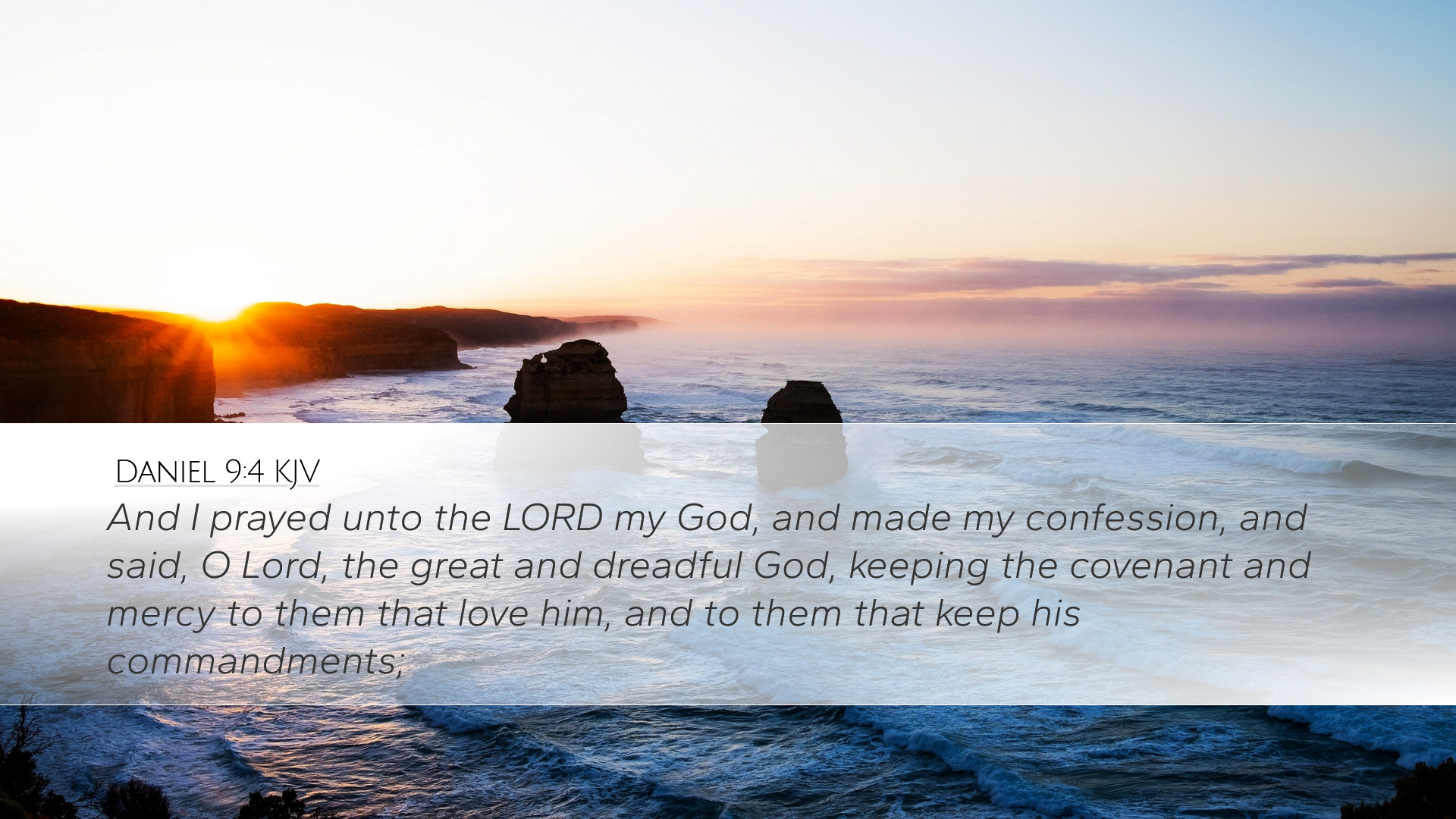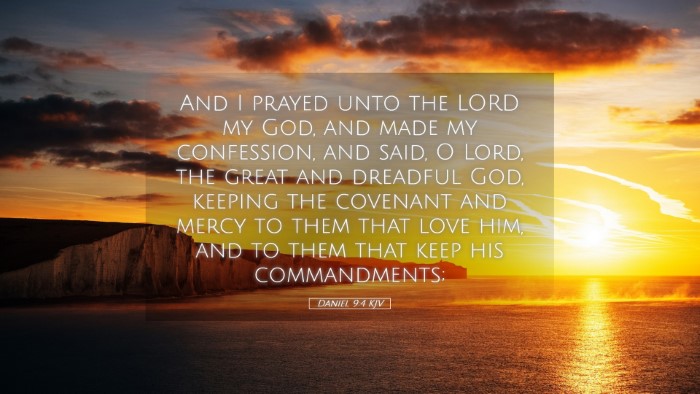Commentary on Daniel 9:4
In Daniel 9:4, we encounter a profound moment of prayer and supplication from the prophet Daniel. The verse reads,
"And I prayed unto the Lord my God, and made my confession, and said, O Lord, the great and dreadful God,
keeping the covenant and mercy to them that love him, and to them that keep his commandments."
This verse serves as a rich source for theological reflection and offers insights crucial for pastors, students, theologians,
and Bible scholars.
The Context of Daniel's Prayer
Daniel's prayer occurs during the ascent of the Babylonian exile, a period marked by profound distress
for the Jewish people. As Matthew Henry notes, this era demands a response not just of sorrow but of earnest
supplication. Daniel's recognition of the situation reveals both a national and personal perspective on
sin and estrangement from God.
An Overview of the Verse
This verse encapsulates the essence of confession, emphasizing both the grandeur of God and the
humility of the supplicant. Daniel acknowledges God's omnipotence by referring to Him as
"the great and dreadful God."
-
The Greatness of God: Daniel affirms God's infinite majesty and power, which is fundamental
in establishing a proper attitude in prayer. Albert Barnes points out that this acknowledgment places God in His
rightful position before us as the sovereign ruler of the universe.
-
The Dreadfulness of God: The term "dreadful" implies reverence and a healthy fear of God’s justice
and holiness. Daniel understands that to approach a righteous God requires recognition of His moral perfection,
which invites a spirit of humility in the author’s prayer.
Covenant and Mercy
Daniel's prayer continues with a vital theology of covenant, explicitly stating God's commitment to those
who love Him: “keeping the covenant and mercy to them that love him.”
-
The Nature of God's Covenant: Adam Clarke emphasizes that God’s covenants are not mere agreements,
but sacred demonstrations of His character and fidelity. The covenant with Israel emphasizes the responsibilities
of both parties; their unfaithfulness does not nullify God's commitment to His promises.
-
The Call to Faithfulness: Daniel’s statement reminds believers of the importance of love and
obedience. The faithful love spoken of here is not just emotional affection but an obedience borne out of
reverence and commitment to God.
The Importance of Confession
Confession is a central theme within this verse, which resonates with doctrines of repentance and restoration.
Daniel’s recognition of his sin and the nation’s sin is pivotal for spiritual renewal.
-
The Role of Confession: Matthew Henry highlights that confession encompasses both
acknowledgment of guilt and an appeal to God's mercy. It is an essential step for receiving forgiveness and
restoration within the covenant.
-
The Corporate Aspect of Sin: Daniel does not merely confess personal sin but also identifies
with the communal failings of Israel. This view aligns with the prophetic tradition, where the leader takes on
the sins of the people, reflecting a profound understanding of communal responsibility before God.
Application for Today
The theological insights from Daniel 9:4 are timeless and speak powerfully into the lives of contemporary believers.
The implications of God's greatness and faithfulness offer a foundation for understanding worship, prayer, and
personal conduct.
-
Understanding God’s Nature: A comprehensive view of God's character inspires worship and prayer.
Believers are encouraged to approach God with reverence and understanding of His attributes.
-
Modern Confession: Just as Daniel interceded for his people, the church today is called to
engage in sincere confession—not only for personal sins but for the corporate failures of the community in
which believers live.
-
Living in Covenant: The reminder of God's covenant loyalty encourages believers to remain
faithful amidst trials. Pastors and leaders should emphasize the importance of loving God through obedience
and godly living.
-
Encouragement for Intercession: Daniel’s example serves as a model for intercessory prayer,
motivating believers to stand in the gap for others and seek God’s mercy on behalf of their communities.
Conclusion
Daniel 9:4 is not merely a historical insight but a powerful reminder that transcends time. It encapsulates
a prayer that embraces the grandeur of God, the weight of confession, and the assurance of His covenant
faithfulness. The insights gathered from public domain commentaries enrich the understanding of this verse,
focusing on its profound implications for both the individual and the community of faith.


